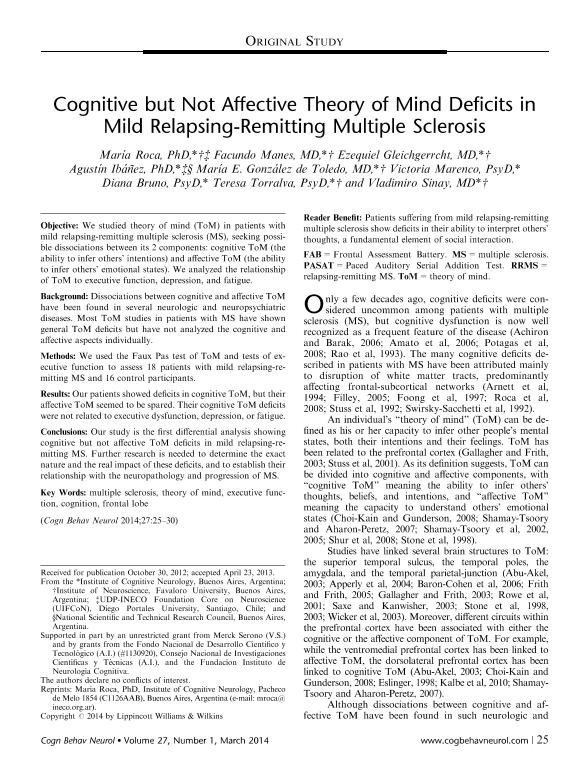Mostrar el registro sencillo del ítem
dc.contributor.author
Roca, María

dc.contributor.author
Manes, Facundo Francisco

dc.contributor.author
Gleichgerrcht, Ezequiel

dc.contributor.author
Ibañez, Agustin Mariano

dc.contributor.author
Toledo, María E. González de
dc.contributor.author
Marenco, Victoria
dc.contributor.author
Bruno, Diana

dc.contributor.author
Torralva, Teresa

dc.contributor.author
Sinay, Vladimiro
dc.date.available
2018-01-16T17:45:55Z
dc.date.issued
2014-03
dc.identifier.citation
Roca, María; Manes, Facundo Francisco; Gleichgerrcht, Ezequiel; Ibáñez Barassi, Agustín Mariano; Toledo, María E. González de; et al.; Cognitive but Not Affective Theory of Mind Deficits in Mild Relapsing-Remitting Multiple Sclerosis; Lippincott Williams; Cognitive and Behavioral Neurology; 27; 1; 3-2014; 25-30
dc.identifier.issn
1543-3633
dc.identifier.uri
http://hdl.handle.net/11336/33430
dc.description.abstract
OBJECTIVE: We studied theory of mind (ToM) in patients with mild relapsing-remitting multiple sclerosis (MS), seeking possible dissociations between its 2 components: cognitive ToM (the ability to infer others' intentions) and affective ToM (the ability to infer others' emotional states). We analyzed the relationship of ToM to executive function, depression, and fatigue.
BACKGROUND: Dissociations between cognitive and affective ToM have been found in several neurologic and neuropsychiatric diseases. Most ToM studies in patients with MS have shown general ToM deficits but have not analyzed the cognitive and affective aspects individually.
METHODS: We used the Faux Pas test of ToM and tests of executive function to assess 18 patients with mild relapsing-remitting MS and 16 control participants.
RESULTS: Our patients showed deficits in cognitive ToM, but their affective ToM seemed to be spared. Their cognitive ToM deficits were not related to executive dysfunction, depression, or fatigue.
CONCLUSIONS: Our study is the first differential analysis showing cognitive but not affective ToM deficits in mild relapsing-remitting MS. Further research is needed to determine the exact nature and the real impact of these deficits, and to establish their relationship with the neuropathology and progression of MS.
dc.format
application/pdf
dc.language.iso
eng
dc.publisher
Lippincott Williams

dc.rights
info:eu-repo/semantics/openAccess
dc.rights.uri
https://creativecommons.org/licenses/by-nc-sa/2.5/ar/
dc.subject
Multiple Sclerosis
dc.subject
Theory of Mind
dc.subject
Executive Functions
dc.subject
Frontal Lobe
dc.subject.classification
Otras Ciencias de la Salud

dc.subject.classification
Ciencias de la Salud

dc.subject.classification
CIENCIAS MÉDICAS Y DE LA SALUD

dc.title
Cognitive but Not Affective Theory of Mind Deficits in Mild Relapsing-Remitting Multiple Sclerosis
dc.type
info:eu-repo/semantics/article
dc.type
info:ar-repo/semantics/artículo
dc.type
info:eu-repo/semantics/publishedVersion
dc.date.updated
2018-01-11T13:49:12Z
dc.journal.volume
27
dc.journal.number
1
dc.journal.pagination
25-30
dc.journal.pais
Estados Unidos

dc.journal.ciudad
Filadelfia
dc.description.fil
Fil: Roca, María. Instituto de Neurología Cognitiva; Argentina. Universidad Favaloro. Facultad de Medicina. Instituto de Neurociencias; Argentina. Universidad Diego Portales; Chile. Consejo Nacional de Investigaciones Científicas y Técnicas; Argentina
dc.description.fil
Fil: Manes, Facundo Francisco. Instituto de Neurología Cognitiva; Argentina. Universidad Favaloro. Facultad de Medicina. Instituto de Neurociencias; Argentina. Consejo Nacional de Investigaciones Científicas y Técnicas; Argentina
dc.description.fil
Fil: Gleichgerrcht, Ezequiel. Instituto de Neurología Cognitiva; Argentina. Universidad Favaloro. Facultad de Medicina. Instituto de Neurociencias; Argentina
dc.description.fil
Fil: Ibáñez Barassi, Agustín Mariano. Universidad Diego Portales; Chile. Instituto de Neurología Cognitiva; Argentina. Consejo Nacional de Investigaciones Científicas y Técnicas; Argentina
dc.description.fil
Fil: Toledo, María E. González de. Instituto de Neurología Cognitiva; Argentina. Universidad Favaloro. Facultad de Medicina. Instituto de Neurociencias; Argentina
dc.description.fil
Fil: Marenco, Victoria. Instituto de Neurología Cognitiva; Argentina
dc.description.fil
Fil: Bruno, Diana. Instituto de Neurología Cognitiva; Argentina
dc.description.fil
Fil: Torralva, Teresa. Universidad Favaloro. Facultad de Medicina. Instituto de Neurociencias; Argentina. Instituto de Neurología Cognitiva; Argentina
dc.description.fil
Fil: Sinay, Vladimiro. Instituto de Neurología Cognitiva; Argentina. Universidad Favaloro. Facultad de Medicina. Instituto de Neurociencias; Argentina
dc.journal.title
Cognitive and Behavioral Neurology

dc.relation.alternativeid
info:eu-repo/semantics/altIdentifier/url/https://insights.ovid.com/pubmed?pmid=24674963
dc.relation.alternativeid
info:eu-repo/semantics/altIdentifier/doi/http://dx.doi.org/10.1097/WNN.0000000000000017
dc.relation.alternativeid
info:eu-repo/semantics/altIdentifier/url/http://journals.lww.com/cogbehavneurol/pages/articleviewer.aspx?year=2014&issue=03000&article=00004&type=abstract
Archivos asociados
